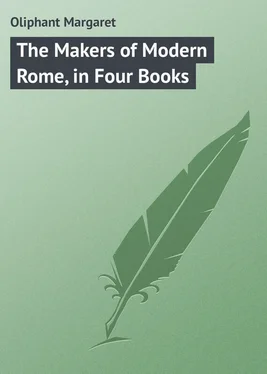Margaret Oliphant - The Makers of Modern Rome, in Four Books
Здесь есть возможность читать онлайн «Margaret Oliphant - The Makers of Modern Rome, in Four Books» — ознакомительный отрывок электронной книги совершенно бесплатно, а после прочтения отрывка купить полную версию. В некоторых случаях можно слушать аудио, скачать через торрент в формате fb2 и присутствует краткое содержание. Жанр: foreign_prose, на английском языке. Описание произведения, (предисловие) а так же отзывы посетителей доступны на портале библиотеки ЛибКат.
- Название:The Makers of Modern Rome, in Four Books
- Автор:
- Жанр:
- Год:неизвестен
- ISBN:нет данных
- Рейтинг книги:5 / 5. Голосов: 1
-
Избранное:Добавить в избранное
- Отзывы:
-
Ваша оценка:
- 100
- 1
- 2
- 3
- 4
- 5
The Makers of Modern Rome, in Four Books: краткое содержание, описание и аннотация
Предлагаем к чтению аннотацию, описание, краткое содержание или предисловие (зависит от того, что написал сам автор книги «The Makers of Modern Rome, in Four Books»). Если вы не нашли необходимую информацию о книге — напишите в комментариях, мы постараемся отыскать её.
The Makers of Modern Rome, in Four Books — читать онлайн ознакомительный отрывок
Ниже представлен текст книги, разбитый по страницам. Система сохранения места последней прочитанной страницы, позволяет с удобством читать онлайн бесплатно книгу «The Makers of Modern Rome, in Four Books», без необходимости каждый раз заново искать на чём Вы остановились. Поставьте закладку, и сможете в любой момент перейти на страницу, на которой закончили чтение.
Интервал:
Закладка:
Mrs. Oliphant
The Makers of Modern Rome, in Four Books
PREFACE
Nobody will expect in this book, or from me, the results of original research, or a settlement – if any settlement is ever possible – of vexed questions which have occupied the gravest students. An individual glance at the aspect of these questions which most clearly presents itself to a mind a little exercised in the aspects of humanity, but not trained in the ways of learning, is all I attempt or desire. This humble endeavour has been conscientious at least. The work has been much interrupted by sorrow and suffering, on which account, for any slips of hers, the writer asks the indulgence of her unknown friends.
BOOK I.
HONOURABLE WOMEN NOT A FEW
CHAPTER I.
ROME IN THE FOURTH CENTURY
There is no place in the world of which it is less necessary to attempt description (or of which so many descriptions have been attempted) than the once capital of that world, the supreme and eternal city, the seat of empire, the home of the conqueror, the greatest human centre of power and influence which our race has ever known. Its history is unique and its position. Twice over in circumstances and by means as different as can be imagined it has conquered and held subject the world. All that was known to man in their age gave tribute and acknowledgment to the Cæsars; and an ever-widening circle, taking in countries and races unknown to the Cæsars, have looked to the spiritual sovereigns who succeeded them as to the first and highest of authorities on earth. The reader knows, or at least is assisted on all hands to have some idea and conception of the classical city – to be citizens of which was the aim of the whole world's ambition, and whose institutions and laws, and even its architecture and domestic customs, were the only rule of civilisation – with its noble and grandiose edifices, its splendid streets, the magnificence and largeness of its life; while on the other hand most people are able to form some idea of what was the Rome of the Popes, the superb yet squalid mediæval city with its great palaces and its dens of poverty, and that conjunction of exuberance and want which does not strike the eye while the bulk of a population remains in a state of slavery. But there is a period between, which has not attracted much attention from English writers, and which the reader passes by as a time in which there is little desirable to dwell upon, though it is in reality the moment of transition when the old is about to be replaced by the new, and when already the energy and enthusiasm of a new influence is making its appearance among the tragic dregs and abysses of the past. An ancient civilisation dying in the impotence of luxury and wealth from which all active power or influence over the world had departed, and a new and profound internal revolt, breaking up its false calm from within, before the raging forces of another rising power had yet begun to thunder at its gates without – form however a spectacle full of interest, especially when the scene of so many conflicts is traversed and lighted up by the most lifelike figures, and has left its record, both of good and evil, in authentic and detailed chronicles, full of individual character and life, in which the men and women of the age stand before us, occupied and surrounded by circumstances which are very different from our own, yet linked to us by that unfailing unity of human life and feeling which makes the farthest off foreigner a brother, and the most distant of our primeval predecessors like a neighbour of to-day.
The circumstances of Rome in the middle and end of the fourth century were singular in every point of view. With all its prestige and all its memories, it was a city from which power and the dominant forces of life had faded. The body was there, the great town with its high places made to give law and judgment to the world, even the officials and executors of the codes which had dispensed justice throughout the universe; but the spirit of dominion and empire had passed away. A great aristocracy, accustomed to the first place everywhere, full of wealth, full of leisure, remained; but with nothing to do to justify this greatness, nothing but luxury, the prize and accompaniment of it, now turned into its sole object and meaning. The patrician class had grown by use, by the high capability to fill every post and lead every expedition which they had constantly shown, which was their original cause and the reason of their existence, into a position of unusual superiority and splendour. But that reason had died away, the empire had departed from them, the world had a new centre: and the sons of the men who had conducted all the immense enterprises of Rome were left behind with the burden of their great names, and the weight of their great wealth, and nothing to do but to enjoy and amuse themselves: no vocations to fulfil, no important public functions to occupy their time and their powers. Such a position is perhaps the most dreadful that can come to any class in the history of a nation. Great and irresponsible wealth, the supremacy of high place, without those bonds of practical affairs which, in the case of all rulers – even of estates or of factories – preserve the equilibrium of humanity, are instruments of degradation rather than of elevation. To have something to do for it, something to do with it, is the condition which alone makes boundless wealth wholesome. And this had altogether failed in the imperial city. Pleasure and display had taken the place of work and duty. Rome had no longer any imperial affairs in hand. Her day was over: the absence of a court and all its intrigues might have been little loss to any community – but that those threads of universal dominion which had hitherto occupied them had been transferred to other hands, and that all the struggles, the great questions, the causes, the pleas, the ordinances of the world were now decided and given forth at Constantinople, was ruin to the once masters of the world. It was worse than destruction, a more dreadful overthrow than anything that the Goths and barbarians could bring – not death which brings a satisfaction of all necessities in making an end of them – but that death in life which fills men's blood with cold.
The pictures left us of this condition of affairs do indeed chill the blood. It is natural that there should be a certain amount of exaggeration in them. We read daily in our own contemporary annals, records of society of which we are perfectly competent to judge, that though true to fact in many points, they give a picture too dark in all its shadows, too garish in its lights, to afford a just view of the state of any existing condition of things. Contemporaries know how much to receive and how much to reject, and are apt to smile at the possibility of any permanent impression upon the face of history being made by lights and darks beyond the habit of nature. But yet when every allowance has been made, the contemporary pictures of Rome at this unhappy period leave an impression on the mind which is not contradicted but supported and enforced by the incidents of the time and the course of history. The populace, which had for ages been fed and nourished upon the bread of public doles and those entertainments of ferocious gaiety which deadened every higher sense, had sunk into complete debasement. Honest work and honest purpose, or any hope of improving their own position, elevating themselves or training their children, do not seem to have existed among them. A half-ludicrous detail, which reminds us that the true Roman had always a trifle of pedantry in his pride, is noted with disgust and disdain even by serious writers – which is that the common people bore no longer their proper names, but were known among each other by nicknames, such as those of Cabbage-eaters, Sausage-mongers, and other coarse familiar vulgarisms.
Читать дальшеИнтервал:
Закладка:
Похожие книги на «The Makers of Modern Rome, in Four Books»
Представляем Вашему вниманию похожие книги на «The Makers of Modern Rome, in Four Books» списком для выбора. Мы отобрали схожую по названию и смыслу литературу в надежде предоставить читателям больше вариантов отыскать новые, интересные, ещё непрочитанные произведения.
Обсуждение, отзывы о книге «The Makers of Modern Rome, in Four Books» и просто собственные мнения читателей. Оставьте ваши комментарии, напишите, что Вы думаете о произведении, его смысле или главных героях. Укажите что конкретно понравилось, а что нет, и почему Вы так считаете.












